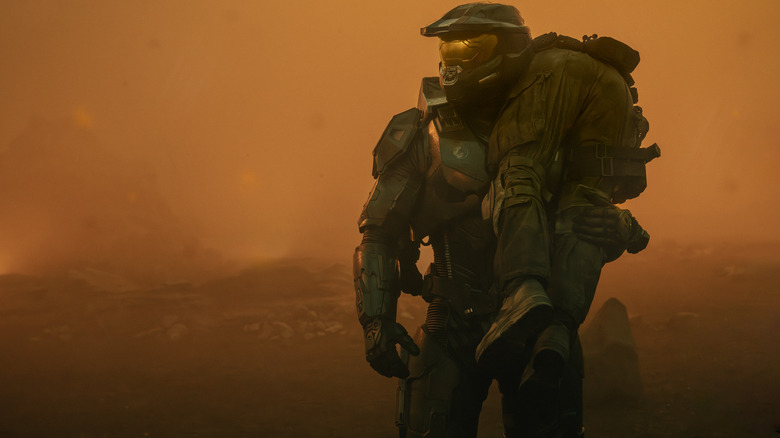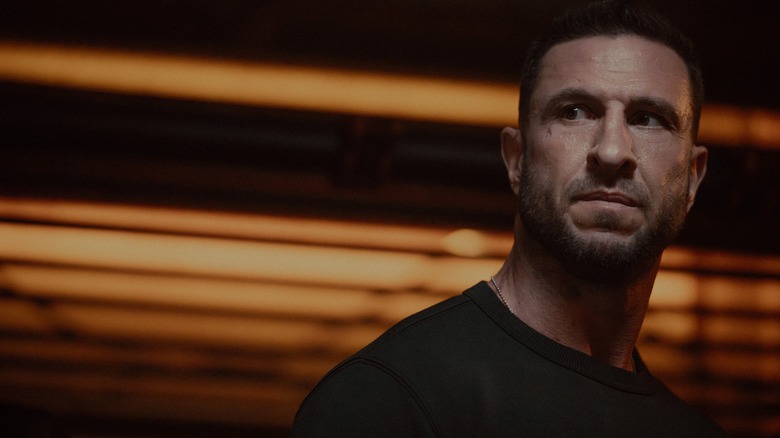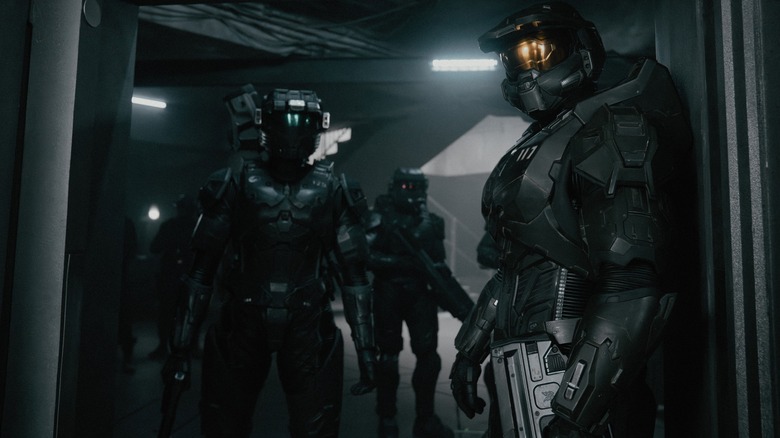Halo Season 2 Review: The Fall Of Reach Falls Flat
Almost two years ago, the decades-long struggle to bring an adaptation of the beloved video game franchise "Halo" to life finally resulted in, well, a seriously underwhelming Paramount+ show. The fact that the live-action debut of the Master Chief, his Spartan super-soldiers, and their epic war against the alien Covenant had to be relegated to a streaming service, as opposed to receiving the full red carpet treatment on the big screen, was probably an indictment in and of itself. It spoke poorly of this irrevocably Silicon Valley-influenced studio system we currently find ourselves in, and of the lack of ambition and imagination of the decisionmakers involved. Ultimately, it also revealed our own shortcomings as an audience — one that couldn't simply be satisfied with a number of tremendously well-realized stories told in their perfect medium. (Disclaimer: this holds true up to and including "Halo 4," at least.)
So when season 1 of "Halo" premiered, with all the pressure in the world to live up to the source material and absolutely zero benefit of the doubt among skeptics that it could actually pull it off, the results were ... predictable, to say the least. The plot was a mess of haphazard storytelling with no overarching vision and certainly no real intention to actually step foot on the eponymous ringworld. The action felt weightless and sloppy, crumbling under the strain of translating video game aesthetics into live action. And the fans? Complaints about divergences from the canon and Master Chief constantly taking his helmet off prevented its intended demographic from judging this show on its own merits.
Small wonder that "Halo" season 2 hit the reset button, overhauling the creative team entirely and all but starting from scratch. For much of the marketing and press tour, lead actor Pablo Schreiber and new showrunner/writer David Weiner have led the charge in terms of damage control. They've addressed numerous criticisms, hyping up significant fan-favorite events ripped straight from the source material and insisting that, rest assured, "Master Cheeks" will be nowhere to be seen. But that only makes it all the more disappointing that, based on the first four episodes made available to the press, it feels like we're right back where we started. And not even a hail-Mary attempt to adapt the seminal Fall of Reach storyline can save it.
The human beneath the helmet
There's a lot to say about what "Halo" season 2 isn't – and we'll get to it, trust me — but what does this latest installment of the series actually have to offer? The early returns are quite promising, believe it or not.
After quickly backtracking on some of the stickier creative choices made in the season 1 finale (among them, Master Chief essentially dying and respawning under the control of artificial intelligence Cortana), we pick up six months later on the battlefield. Spartan 117 and his Silver Team, who enjoy a much more in-depth team dynamic between original characters Kai (Kate Kennedy), Vannak (Bentley Kalu), and Riz (Natasha Culzac), engage Covenant forces conquering the scattered Outer Colonies at an unprecedented rate.
Weiner, his directing team (made up of Debs Paterson and Craig Zisk), and cinematographer Carl Sundberg instantly bring a much-improved sense of visual clarity and energy to the fights — accomplished, ironically enough, by muddying up the action and hiding the dodgier bits of VFX work behind tactile environmental effects like rain and fog, hard-hitting fight choreography, and kinetic camerawork along with appropriately moody lighting. (Those distracting in-helmet POV shots from season 1, meant to evoke first-person shooters, are thankfully discarded entirely.) All end up working in sync to help sell when punches land and bullets strike between Spartans and Covenant aliens.
Elsewhere, the main dramatic thrust of the season provides reason for optimism. Chief and his Spartans, still dealing with PTSD and debilitating scars from their previous battles, remain unhappy about receiving a steady stream of low-risk missions and "babysitting" duties that keep them away from the front lines. John in particular is singled out as unfit for duty due to his mental instability, while injured teammate Riz receives the meatiest subplot as she ponders life outside the strict, suffocating Spartan routine. The introduction of new characters, like the overly antagonistic intelligence officer James Ackerson (a capable, if one-note Joseph Morgan) and Marine Corporal Perez (Cristina Rodlo), brings up an interesting thread about how our heroes exist merely to feed the military's propaganda machine.
Nestled amid all of this politicking resides the hint of a theme about how the Spartans' specialized MJOLNIR armor isn't what makes them who they are. "Everyone knows the Master Chief," one character points out in the season premiere, "I wonder if anyone really knows John." Instead, it's the very real, very flawed human inside that matters most.
Reach exceeds its grasp
The problems with "Halo" begin to mount, however, as we return to an issue that was especially prevalent throughout the first season.
Despite the writing team's best efforts (teleplay credits include Weiner, Ahmadu Garba, Marisha Mukerjee, and Tom Hemmings), they struggle to find enough of a balance between guns-blazing thrills and the far less interesting setup for the oddly-structured plot. Season 2 bookends its first four episodes with the most impressive set pieces of the season — episode 4, tellingly titled "Reach," takes the "Game of Thrones" approach of throwing an hour-long battle sequence at viewers that, though ambitious, still amounts to less than the sum of its parts — but "Halo" spends much of the early episodes in offices, hallways, and other drab military settings.
As Ackerson, a returning Jacob Keyes (Danny Sapani), and their ties to the sinister ONI (Office of Naval Intelligence) complicate matters for the Spartans, viewers are lucky if these poorly-staged conversations ever opt for anything more than unmotivated shot/reverse shot angles. Rarely has the difference between main unit and second unit filming — the latter of which likely handled the dazzling action sequences in Marvel Studios-like fashion — felt as stark as it does here.
By the time we get to the Reach-sized elephant in the room, a glaring lack of proper buildup undercuts what should be the season's biggest selling point. Fans know exactly how significant the fall of humanity's second-most important planet ought to be: an event with such tragic import in the canon that there are no less than three separate adaptations preceding "Halo" season 2. Yet here it unfolds almost as an afterthought, derailed too often by unnecessary subplots and clunky narrative cul-de-sacs. (The wheel-spinning surrounding the whereabouts of Natascha McElhone's Dr. Catherine Halsey and a B-story following Bokeem Woodbine's failed Spartan-turned-pirate Soren are nothing short of egregious.) Rather than a steady march towards an inevitable defeat, the fall of Reach instead plays out like hitting obligatory signposts taken from far superior stories.
"Spartans never die," goes a popular refrain from the franchise novels that's freshly reemphasized throughout the episodes. But when it comes to this misfiring series, viewers will be left with the opposite impression. Maybe Master Chief — or, at least, the "Halo" streaming version of him — should just get a mercy killing, after all.
/Film Rating: 4 out of 10
"Halo" season 2 debuts with a two-episode premiere on Paramount+ Thursday, February 8, 2024.


